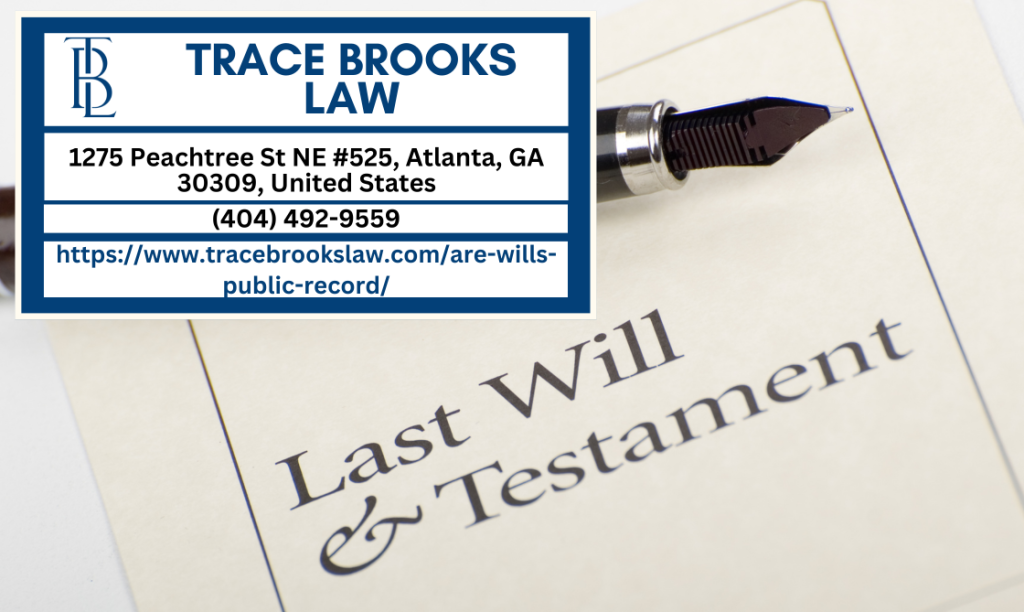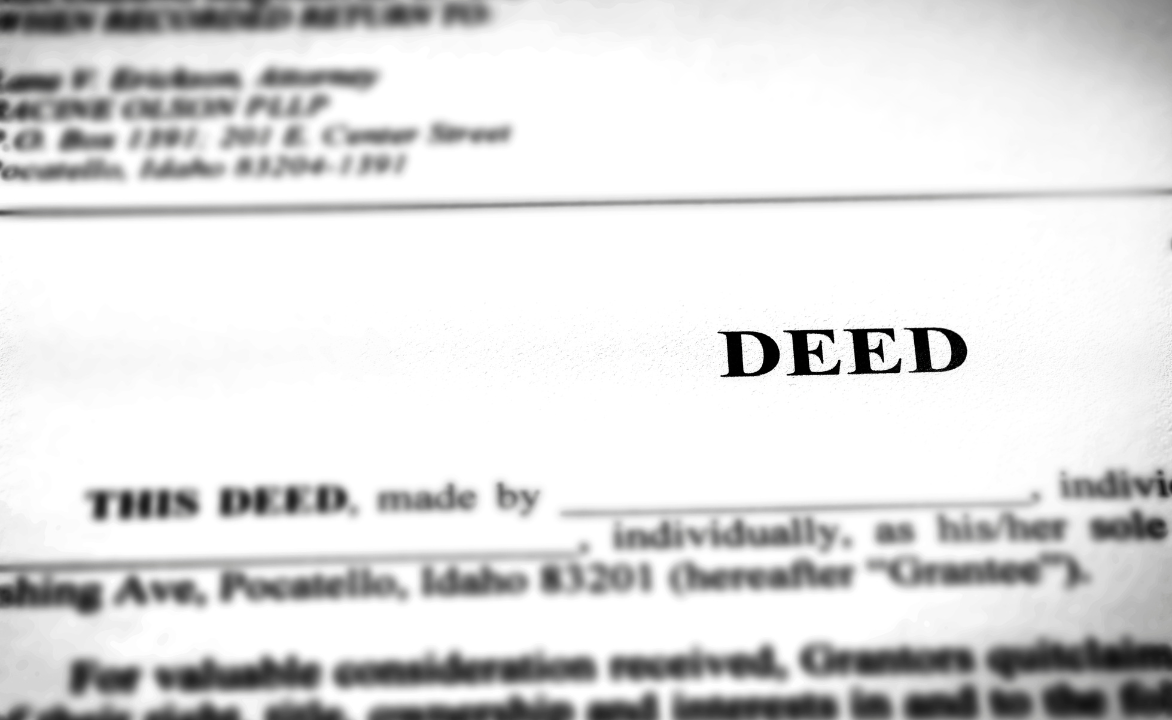Wills are essential documents in estate planning, outlining how a person’s assets should be distributed after their passing. However, many individuals are unsure whether wills become public records and what that means for their privacy. In Georgia, the public accessibility of wills depends on whether they have been submitted to probate, a legal process that validates the will and oversees the administration of the deceased’s estate. Knowing the specifics of when and how wills become public is critical for individuals looking to protect their privacy and ensure their estate is handled according to their wishes.
If you are going through the probate process or seeking guidance on estate planning, consulting an experienced probate attorney can make all the difference. At Trace Brooks Law, our dedicated team of Atlanta probate lawyers is here to assist with probate matters, from questions regarding public access to wills to creating private, effective estate plans. Call us today at (404) 492-9559 to schedule a consultation and ensure your estate planning goals are met with professionalism and care.
Are Wills Public Record in Georgia?
In Georgia, the public accessibility of wills largely depends on whether they have been submitted for probate. Until a will is officially filed with the probate court, it generally remains a private document. Once filed, the will typically becomes part of the public record, allowing interested parties to access its contents through legal avenues.
When Wills Become Public After Death
A will becomes a public record when it is filed with the probate court after the testator’s death. The filing process begins when the executor submits the will to the probate court to authenticate its validity. This filing is a crucial step, as probate ensures that the deceased person’s wishes are followed and the estate is distributed according to the will’s instructions.
In Georgia, probate proceedings are generally open to the public. Once the will enters the probate process, its contents are accessible to anyone who requests them from the court. This transparency supports fairness and accountability but also means that sensitive details, like asset distribution or named beneficiaries, become public knowledge. However, if the will was not filed for probate—such as when all assets are transferred outside of probate—it may not enter the public domain.
Who Is Permitted to View a Will During Probate?
Once a will is filed for probate, it can be viewed by various parties. Immediate access is typically granted to individuals with a direct interest in the estate, such as heirs, beneficiaries, and creditors. These parties are informed of the probate proceedings and may review the will to understand their potential claims. Executors and legal representatives involved in the administration of the estate also have access to the document.
Beyond those directly involved, any member of the public may request a copy of the will once it becomes part of the probate court’s records. Access is subject to the court’s procedures, which may include filing a request and paying a nominal fee. This openness highlights the importance of privacy-conscious estate planning for those who wish to limit public scrutiny of their estate details. Understanding when and how wills become public can help you make informed decisions about available estate planning strategies, balancing transparency with privacy concerns.
Accessing Wills in Georgia
In Georgia, accessing a will is often necessary for beneficiaries, heirs, or others with an interest in a deceased person’s estate. Wills become part of the public record once they are filed with the probate court, making them available for review. Understanding the process of locating probate court records and addressing potential challenges can simplify this task.
Steps to Locate Probate Court Records
Locating a will through probate court records involves a systematic approach. Breaking the process into smaller steps helps ensure accuracy and efficiency.
- Identifying the Probate Court with Jurisdiction: The first step is determining which probate court has jurisdiction over the estate. Typically, this is the court in the county where the deceased lived at the time of death. However, if the deceased owned property in another county, ancillary probate proceedings might also be necessary. Contact the clerk of the court for clarification.
- Preparing Necessary Information for the Request: To streamline the process, gather all essential details about the deceased, such as:
- Full name (including aliases, if applicable)
- Date of death
- Place of last residence
Having a copy of the death certificate can expedite the search process, as it often includes these critical details.
- Contacting the Probate Court: Once the correct court is identified, reach out to the probate court clerk. Depending on the county, this can be done in person, over the phone, or via email. Confirm the court’s specific process for requesting records, including required forms and associated fees.
- Submitting the Request for Records: Complete and submit the request for probate records. This may involve filling out a formal application or submitting a written request. If requesting copies, specify whether you need certified or standard copies, as certified copies are often required for legal matters.
- Following Up and Retrieving the Records: If records are not immediately available, follow up with the court periodically. Older records or cases stored in archives may take additional time to retrieve. Staying in contact ensures you are updated on the progress.
| Steps | Details |
|---|---|
| Identify the Court | Find the probate court in the deceased’s county of residence. |
| Prepare Information | Gather the deceased’s name, date of death, and residence details. |
| Contact the Court | Reach out to the court clerk to verify the record request process. |
| Submit the Request | File the request and specify if you need certified or standard copies. |
| Follow Up | Check back with the court for updates, especially for older or archived records. |
Online Resources for Probate Records in Georgia
Several counties in Georgia provide online access to probate records, offering a valuable resource for those seeking wills or other estate-related documents. These platforms save time and effort by allowing users to access records from their homes or offices.
For example, the Georgia Probate Records database aggregates information from multiple counties, while individual county websites focus on local probate cases. These tools enable users to search by various criteria, including the deceased’s name, probate case number, or filing date, making it easier to locate the desired records.
The type and extent of information available online vary by county. Some databases offer full scans of probate documents, allowing for comprehensive review, while others provide only basic summaries or case details. Additionally, certain counties have yet to digitize their records, which can limit accessibility. For individuals facing such limitations, an in-person visit to the probate court is often necessary. Despite these challenges, online resources remain a convenient first step for many, reducing the need for preliminary court visits and enabling efficient case searches.

Challenges in Accessing Older or Unfiled Wills
Accessing older or unfiled wills in Georgia can be significantly more complicated than retrieving recent or digitized probate records. These challenges often require additional effort, legal steps, or creative problem-solving to address.
Retrieving Archived Probate Records
Older probate records are often stored in physical archives, as many counties did not digitize records until recent years. This means that court staff may need to locate and retrieve these files manually, which can delay the process. Depending on the county, this may require submitting a formal request and paying a retrieval fee. Additionally, if the archives are located off-site, further delays may occur.
Dealing with Damaged or Incomplete Documents
Historical documents may suffer from deterioration due to age, poor storage conditions, or frequent handling. In some cases, parts of the records may be missing or illegible. Courts may offer certified summaries of these records as an alternative, but the lack of complete information can create difficulties for legal or genealogical purposes.
Locating Unfiled Wills
Unfiled wills pose a unique challenge, as they are not part of the public record. These wills often remain in private custody, such as a family member’s home, a safe deposit box, or an attorney’s office. Gaining access to such documents typically requires contacting individuals who may know the location of the will. Legal authorization, like a court order, may be necessary to access wills stored in secure locations.
Addressing the Implications of Missing Wills
If a will cannot be found or was never filed, the estate may be treated as if the deceased died intestate. This can significantly alter the distribution of assets, as the estate will be divided according to Georgia’s intestacy laws rather than the deceased’s wishes. Understanding these implications highlights the importance of ensuring wills are properly stored and filed.
How Probate Makes Wills Publicly Accessible
In Georgia, a will becomes publicly accessible when it is filed with the probate court after the testator’s death. This filing initiates the probate process, during which the court validates the will and oversees the distribution of the deceased’s estate. The executor is responsible for submitting the original will to the court, and once filed, it becomes part of the public court records.
The transparency of probate serves several purposes. It allows heirs, beneficiaries, and creditors to access the will and verify its terms, ensuring that all parties involved are treated fairly. Public access also deters fraud and facilitates the resolution of disputes. However, this openness means that anyone, not just those with a direct interest in the estate, can request to view or obtain a copy of the will through the probate court.
Differences Between Probate and Non-Probate Assets
Not all assets pass through probate, which creates a distinction between probate and non-probate assets. Probate assets are those solely owned by the deceased at the time of death and include property such as real estate, bank accounts, and personal belongings without a designated beneficiary or joint owner. These assets are subject to the court-supervised probate process and are distributed according to the terms of the will or Georgia’s intestacy laws.
Non-probate assets, on the other hand, bypass the probate process entirely. These assets include:
- Jointly owned property with rights of survivorship.
- Pay-on-death (POD) and transfer-on-death (TOD) accounts.
- Assets held in trusts.
- Life insurance policies and retirement accounts with designated beneficiaries.
Since non-probate assets are not subject to public court proceedings, they offer greater privacy and typically pass directly to the named beneficiaries. For individuals concerned about privacy, incorporating non-probate strategies, such as trusts or beneficiary designations, into their estate planning can minimize public exposure of their assets.
Legal and Practical Implications of Public Wills
While privacy and public access have been extensively discussed, the broader legal and practical implications of public wills warrant attention. A will’s public nature can affect not only the testator’s privacy but also the practical execution of their estate plan and the potential for disputes among heirs and beneficiaries.
The Impact of Public Access on Estate Litigation
Once a will becomes public, it is accessible to anyone, including parties who may not have been directly involved in the testator’s life. This openness can sometimes lead to challenges from distant relatives or other individuals claiming a stake in the estate. Public access may also facilitate will contests, especially in cases where the document disinherits a potential heir or contains unexpected provisions. Legal disputes arising from public records can delay the probate process, increase costs, and strain family relationships.
Protecting Against Fraud and Unauthorized Claims
The transparency of probate records can deter fraudulent claims but may also expose the estate to risks. For example, creditors or individuals posing as heirs might exploit public information to make illegitimate claims. To mitigate this risk, executors must maintain meticulous records and respond promptly to court requirements to validate claims. Advanced estate planning, such as including clear disinheritance clauses, can also reduce vulnerabilities to unauthorized claims.
Managing Estate Administration Costs
The public nature of probate can sometimes increase administrative costs. Executors must file detailed inventories, respond to public inquiries, and manage disputes, all of which require additional time and resources. The added scrutiny of public records can make the process more cumbersome compared to private estate administration methods, such as those facilitated by trusts. For individuals with substantial estates, the financial implications of public probate underscore the importance of planning for efficiency and cost reduction.
Addressing Emotional Considerations for Beneficiaries
Public disclosure of a will’s contents can lead to emotional consequences for beneficiaries, especially when the distribution of assets is unexpected or controversial. For instance, unequal distributions or the exclusion of certain individuals can result in hurt feelings or family conflicts. While transparency is necessary to ensure fairness, the emotional toll of public access can sometimes outweigh its benefits. Estate planners can address this issue by fostering clear communication and ensuring that estate decisions reflect the testator’s values and relationships.
Partner with Trace Brooks Law for Your Estate Planning Needs
Estate planning and probate can be complex, especially when it comes to ensuring your wishes are honored while maintaining your privacy. Whether you’re dealing with the public accessibility of a will or exploring options to keep your estate matters private, having the right legal support is invaluable. Taking proactive steps now can provide peace of mind for you and your loved ones in the future.
Trace Brooks Law is here to help you with every aspect of probate and estate planning in Atlanta. Our team offers personalized advice tailored to your unique circumstances, ensuring a smooth process and protecting your estate’s integrity. Contact us today at (404) 492-9559 to schedule a consultation and take the first step toward securing your estate’s future.



